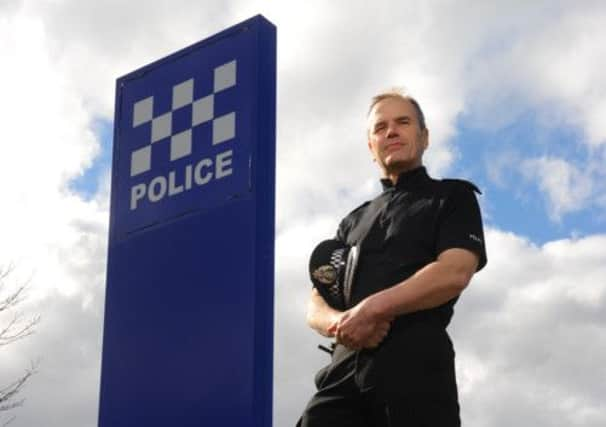Police drumming to old beat of House music


These are the pretence of any local accountability or consultation together with cost-cutting measures that distance the force yet more from the everyday public it purports to serve. Two examples are already coming to light that should prompt questions to the justice secretary Kenny MacAskill, and encourage Holyrood’s justice committee to haul the Police Scotland Chief Constable, Stephen House, before it to explain himself.
The first, an apparent change of approach to the policing of the sex trade in Edinburgh, is a serious matter that could put peoples’ lives at risk. The second, the willingness to leave Scotland’s police-sponsored pipe bands to their own devices, while undoubtedly of a less vital nature, displays a heavy-handed detachment, or even arrogance, towards community relations that is no less disturbing.
Advertisement
Hide AdAdvertisement
Hide AdOne is left with the unhappy conclusion that Kenny MacAskill has not so much merged Scotland’s eight regional police constabularies as effected a takeover by Strathclyde Police with all that that entails. Such an outcome was always to be feared and was in the minds of many when centralisation was first mooted – now the evidence is developing that such a fear is being realised.
Last week two saunas in Edinburgh were raided by some 150 officers, resulting in what the police describe as the confiscation of drugs valued at £500,000 together with various business documents that might help with further inquiries. It is my understanding that neither Edinburgh councillors nor the city’s Police and Fire Scrutiny committee were consulted in advance of the raid regarding any possible change in the approach to policing Edinburgh’s saunas.
Whatever one thinks of the capital’s past policy of allowing licensed saunas to provide sexual services rather than have prostitutes touting for business in bars and curbsides (or customers cruising around looking for them), one would expect any change in approach to at least be discussed by elected politicians for setting the policy. Representatives of the police, prostitutes, health professionals and social workers could all be consulted; any changes could then be agreed and the management of new procedures planned with a realistic and understood timeline.
If the raid was not a one-off and the police approach has indeed changed to that which the Strathclyde force previously took in Glasgow, then none of the consultative procedures that could have been expected to have happened before centralisation – and are vital to good policing through local support – have survived.
Maybe the Scottish Police Authority, the body designed to hold Police Scotland to account and made up of those with some experience and knowledge of policing matters, discussed the policing of the sex trade at one of its nine meetings to date. But it hasn’t.
It is not as if Kenny MacAskill will have taken the decision. After all, countless assurances were given that the justice secretary would not become involved in such operational matters. I am sure Mr MacAskill, also an Edinburgh MSP, would plead ignorance and innocence in the matter. No doubt the minister can clarify his role, or lack of one, in the interests of reassuring the public.
For, if the police approach has changed and there has been no local consultation, no central consultation and the minister is oblivious – then our politicians have possibly created a state police which does what it wants and is accountable to no one. That would be bad for the police as well as the public.
The issue of the police pipe bands is just as murky and sadly, given the great historical traditions and world-class performances of many of them, is likely to leave Scotland poorer both culturally and in developing good community relations.
Advertisement
Hide AdAdvertisement
Hide AdPolice pipe bands do not in themselves solve or even prevent crimes and nobody, not least the pipers or drummers who join them, claims this. Nevertheless they are a tangible force for good in developing local community relations. They are also very cheap to run, for they now are populated mainly by civilians and police officers are not given special shifts or help to participate, such assistance ending decades ago. The usual position is that the five police pipe bands, formed from the eight former police constabularies, had to find at least 50 per cent of their running costs from private receipts and sponsorships.
The force contribution to a Grade 1 band such as Lothian & Borders might only cost half of its annual £30,000 running costs. It is not the money that counts in preserving the police-sponsored pipe bands, though, it is the moral support from the police leadership that matters and that has been sadly lacking. In this regard Stephen House is known to be no friend of police pipe bands.
Last November, Lothian & Borders Police Pipe Band – seven times world champions – decided to disband, as it faced an uncertain future as the forces amalgamated. The band decided it was more dignified to fold than struggle on, possibly losing its top ranking and dying a slow, inglorious death.
The Central Police Band chose to become the Bannockburn & District Pipe Band while both the Strathclyde and Fife bands, both Grade 1 and the former with more honours than any other, were renamed but will face their own financial challenges as Police Scotland support cannot be guaranteed.
For Lothian & Borders, originally formed by the Lord Provost of Edinburgh as the city’s band back in 1882, only a civic intervention can give hope for any Grade 1 band to continue – for the lack of commitment from the Police Scotland chief constable is unquestioned.
Be it policing policy or community relations, a centralised police does not ensure the public gets what it wants. Let us hope the savings are worth it.